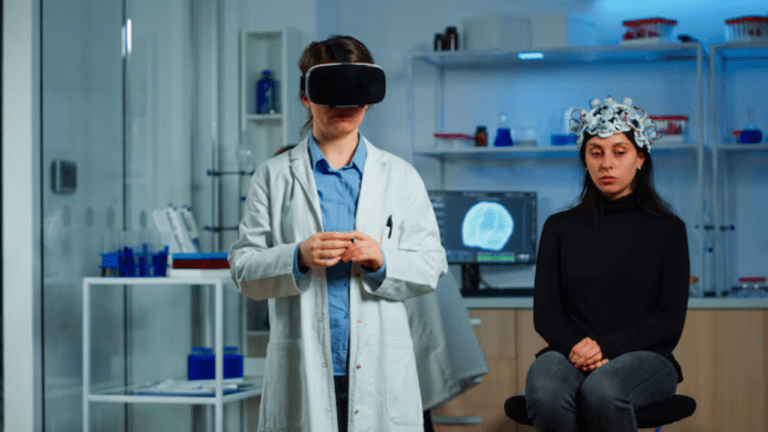From Darkness to Light: How Ketamine Therapy Offers Hope for PTSD Survivors

For individuals living with PTSD, each day can be a battle against overwhelming feelings and memories. Traditional therapies, like talk therapy and medications, are helpful, but some people still struggle to find lasting relief. Ketamine therapy is emerging as a promising option, offering hope to those who have found limited success with other treatments. This innovative therapy, now available at Nirvanix Health, has been shown to reduce PTSD symptoms by promoting mental and emotional healing.
Here’s how ketamine therapy is helping PTSD survivors move from darkness to light, and why it’s an effective tool in mental health care.
What Are Micronutrients and Why Do They Matter?
Micronutrients include vitamins (like A, C, D, E, B-complex) and minerals (like magnesium, iron, zinc, and selenium) that support critical body functions, from brain health to immune strength. Unlike macronutrients (proteins, fats, and carbs), which provide energy, micronutrients are catalysts that help your body produce energy, protect against disease, and keep your metabolism in balance. While a balanced diet helps, factors like stress, age, medication, and lifestyle can influence how well your body absorbs and uses these nutrients. Micronutrient deficiencies are more common than you might think and can affect mental clarity, energy levels, immune function, and even mood.
Understanding PTSD and the Limits of Traditional Treatments
Post-Traumatic Stress Disorder (PTSD) can develop after experiencing or witnessing a traumatic event, leading to symptoms like flashbacks, emotional numbness, and anxiety. For many, these symptoms can feel insurmountable, interfering with work, relationships, and everyday life. Traditional PTSD treatments usually involve a combination of therapy and medications like SSRIs (selective serotonin reuptake inhibitors), which can take weeks or even months to work and often come with side effects. Ketamine therapy offers an alternative approach, providing faster relief from PTSD symptoms by affecting brain pathways in ways traditional treatments don’t. In fact, some patients report noticeable improvements in their symptoms after just one or two ketamine sessions.
How Does Ketamine Therapy Work for PTSD?
Ketamine was originally developed as an anesthetic, but researchers have discovered it has powerful antidepressant effects. In controlled doses, ketamine interacts with glutamate, a neurotransmitter involved in mood regulation and memory processing. By targeting this system, ketamine can “reset” dysfunctional brain pathways associated with PTSD, depression, and anxiety.
During a ketamine therapy session:
1. Ketamine is administered intravenously in a medical setting, typically lasting about 40-60 minutes.
2. Patients experience a relaxed, dissociative state, allowing them to process traumatic memories without feeling overwhelmed.
3. Therapeutic effects often continue after the session, helping to reduce symptoms and providing a renewed sense of control and well-being.
This unique approach provides relief from the negative thought patterns associated with PTSD, helping patients gain perspective and begin the process of recovery.
The Benefits of Ketamine Therapy for PTSD
1. Rapid Relief: Unlike traditional antidepressants, which can take weeks to work, ketamine often provides fast relief from symptoms, making it invaluable for those with severe PTSD.
2. Reduction in Anxiety and Depression: Many PTSD sufferers experience co-existing anxiety and depression; ketamine therapy can relieve these symptoms as well.
3. Enhanced Resilience: By rewiring brain pathways, ketamine fosters emotional resilience, enabling individuals to process trauma with greater ease.
4. Improved Quality of Life: Many patients report improved sleep, reduced intrusive thoughts, and a renewed ability to engage in daily life.
Why Ketamine Therapy is Different
One of the unique aspects of ketamine therapy is its dissociative effect. During treatment, patients often describe a feeling of detachment from their traumatic memories, allowing them to revisit these memories without triggering the usual emotional response. This process helps individuals process trauma from a safe, objective perspective, leading to healing and reduced symptom intensity. Additionally, ketamine’s impact on glutamate can promote neuroplasticity – the brain’s ability to reorganize and form new connections. This is key for PTSD survivors, as it can enable the brain to “unlearn” harmful responses and adopt healthier, more balanced thought patterns.
Who Can Benefit from Ketamine Therapy?
Ketamine therapy can be an option for those who:
● Have tried other PTSD treatments with limited success
● Struggle with severe PTSD symptoms impacting their quality of life
● Experience co-existing depression or anxiety
● Are seeking an innovative approach to recovery However, ketamine therapy is not suitable for everyone. During a consultation, our team at Nirvanix Health will carefully assess your health history, current medications, and wellness goals to determine if ketamine is right for you.
Starting Your Journey to Recovery with Nirvanix Health
At Nirvanix Health, we understand how debilitating PTSD can be. Our compassionate team is dedicated to helping you find relief and rediscover your sense of self. With ketamine therapy, you can begin to move beyond the trauma, one session at a time. Your journey from darkness to light doesn’t have to wait – contact Nirvanix Health to learn how ketamine therapy can offer hope, healing, and a brighter future.
Hashtags
#PTSDRecovery #KetamineTherapyAustin #MentalHealthMatters
#NirvanixHealth #TraumaHealing #InnovativeTherapies
#MentalWellness






